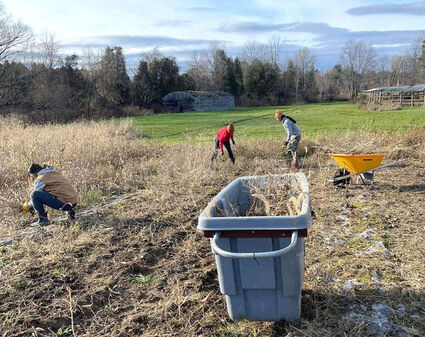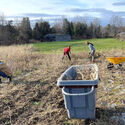The Story of Onkwe

Ashley Thompson, Donna Rockwell-Jock and Nelson Jock, members of Onkwe. Back row stand Kiliii Yuyan and Charles Mann, National Geographic photographer and writer in October 2020.
In the length of time for us to notice and experience the effects of climate change has been the length of time Onkwe was created. Shaped by our prophecies and prodded on climate change, Onkwe was created out of necessity. Bare minimum necessities - like having enough food to eat.
The small group started planting just east of Akwesasne, on a plot of land intended for the Akwesasne Freedom School.
Donna Rockwell-Jock shared her stories of what Onkwe was like at the beginning, "Basically, it was just three of us – Dean George, Nelson Jock and me. We asked the Akwesasne Freedom School for permission to plant there and they agreed. We planted corn, beans, and squash, but also tomatoes, onions, potatoes - everything. We were careful not to use GMO seeds and saved our good seeds for the next year. At the end of the season, we encouraged our elders to come and take from our gardens. At first, they felt funny, not having worked in the garden. But that is why we planted – we planted our gardens to feed our elders and our young children."

She added, "I remember Jean Herne and Myron Clute stopping in. They really encouraged us to continue gardening."
After a few years gardening at the east end of Akwesasne, Onkwe moved to Tsionkwanatiio. By then Onkwe had added a few more members. Levi, Sky and Jane joined in the planning of the gardens, working the gardens each day and in harvesting.
Jock continued, "Everyone needs to eat. And everyone needs to put food away. We need to teach our children how to grow food, store it and preserve it. At that time, we didn't know the pandemic was coming."

Her concern is real and backed by science. The questions are being asked by Indigenous people around the world - What are we going to do in a climate that is changing so quickly, it's hard to adapt? How are we going to reach a level of safe food sovereignty? Who will feed our children in ten years from now, twenty years? We need to know they can feed themselves, that they can grow what they need to survive. We have all this knowledge – and the joy of working in a garden and we want to pass that on to our younger generation – our kids. All of our kids.
Jock said, "For our younger ones, we put our lives into this, and they don't know it."
Onkwe's members have grown over the years, but with the pandemic, members come and go, concerned for their own health and the health of their families. Even after a large harvest this past summer, community members were encouraged to pick the gardens. Again, some felt uncomfortable having not worked in the gardens and others weren't interested in garden fresh food.

She added, "We really encouraged our community members to come and harvest the gardens. We want to see the gardens completely harvested and eaten or preserved. We would rather see the garden harvested than to see tomatoes rot on the vine because they weren't picked."
Onkwe members talked about the Akwesasne community and how they all work together whether it was to plow the gardens, looking for equipment, or taking food to other Nations.
Onkwe has worked with Bare Bones Farm, Akwesasne Task Force on the Environment, SRMT Environment, Ase Tsi Tewaton, the Akwesasne Freedom School, the Hogansburg Akwesasne Volunteer Fire Department, Thompson Island.
Onkwe has formed as an official not-for-profit group which has helped with equipment, purchasing seeds and setting up events for the community. This past summer Onkwe did several Nation-to-Nation trades – providing Tonawanda with tobacco, and Onondaga, Salamanca and Allegany with fresh vegetables.
Ashley Thompson, another Onkwe member said, we want to grow enough for our community, for giving to other Nations, and to keep some for the group.
Akwesasne was witness to this, this past summer when Nelson Jock coordinated the giveaway of over 50,000 pounds of fresh food. In one set-up he handed out over 20,000 pounds of potatoes in two hours. And yes, someone kept track of 18, 975 Mohawks stopping in. Jock is always working, always looking for ways to feed Akwesasne. He is there every day, working in the gardens.
It was Nelson who coined the phrase, "Have a good time in the garden."
They were talking about the dinners they have, each week they spend one evening sharing a meal.
He said, "We have a good time at our dinners. We need to have a good time in the garden."
They all admit gardening can be a chore, but the harvest, the comradery and the sharing at the end makes up for all for the work put in. Onkwe isn't without its challenges – the first and foremost is encouraging young folks to join in.
Ashley said, "At one time or another, we will drag in a group of kids to work with us. They are shy and reluctant at first, then relax and have a really good time – working in the gardening, talking and joking around. It's a good energy, and they leave happy.

They talked about the coming gardening season and plans for this spring, summer and fall – from the maple season, gathering seeds, to planting, and the possibility of a greenhouse.
Jock said, "I've worked all my life to retire to do this. It's good. It's all good."


















Reader Comments(0)